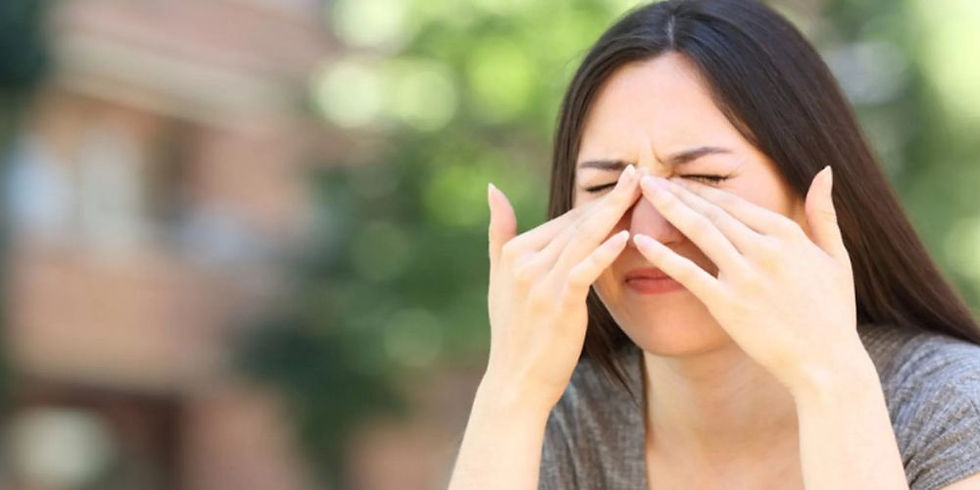How Air Pollution Affects Your Eyes - Dr. Reena Sethi Shares Simple Drug-Free Eye Care Tips
- Arunodaya Deseret Eye Hospital
- Nov 8, 2025
- 4 min read

The thick haze that blankets Delhi-NCR every winter doesn’t just choke your lungs - it’s also attacking your eyes. With air-quality levels often reaching the “severe” category, thousands of residents complain of redness, watering, and irritation.
According to Dr. Reena Sethi, Senior Ophthalmologist and Cataract Surgeon at Arunodaya Deseret Eye Hospital (ADEH), prolonged exposure to toxic air can inflame and dry out the delicate surface of the eyes, leading to discomfort and, in some cases, long-term vision issues.
“The eyes are constantly exposed to air. Every speck of dust, soot, or chemical in the atmosphere can land directly on them, irritating the surface and disturbing the tear film,”-Dr. Reena Sethi, Arunodaya Deseret Eye Hospital
How Air Pollution Damages the Eyes
Air pollution is a mix of fine particles (PM 2.5, PM 10) and harmful gases (NO₂, O₃, SO₂). These pollutants irritate and inflame the outer layer of the eye.
The Main Effects Include:
Dry Eyes: Pollutants break down the tear film, reducing natural lubrication.
Allergic Conjunctivitis: Continuous exposure can make eyes itchy, red, and watery.
Eye Fatigue: Constant irritation causes strain, especially in people who work long hours on digital screens.
Increased Infection Risk: Dust and microbes in polluted air make the eyes more prone to infection.
“Most people blame screens for irritation, but the truth is - pollution is equally, if not more, damaging,” notes Dr. Sethi.
Delhi-NCR’s Alarming Reality
In November 2025, the average PM 2.5 level in Delhi hovered above 150 µg/m³ - nearly ten times the WHO’s safe limit. At ADEH, specialists report a sharp rise in patients with dryness, burning, watering, and blurred vision during high-pollution weeks.
While medications can help, Dr. Sethi emphasizes that the first line of defense lies in adopting simple, drug-free eye-care practices.
Dr. Reena Sethi’s Natural Eye-Care Routine (No Medicines Required)
1. Rinse with Cold Water
Wash your eyes gently with cool, clean water twice a day. This flushes out dust and relieves irritation naturally.
2. Wear Protective Eyewear
Whenever you step outside, use wrap-around sunglasses. They act as a barrier against particulate matter, dust, and UV rays.
3. Purify the Air Around You
Use HEPA air-purifiers indoors, and avoid burning incense or candles during smog periods. A cleaner environment means calmer eyes.
4. Stay Hydrated
Drink plenty of water. Dehydration worsens dryness, while hydration restores the tear film naturally.
5. Blink Often
Follow the 20-20-20 rule if you work on screens - every 20 minutes, look 20 feet away for 20 seconds. It helps maintain moisture.
6. Eat for Your Eyes
Include carrots, spinach, almonds, flaxseeds, and citrus fruits in your diet. Nutrients like Vitamin A, C, E and Omega-3 fatty acids support eye health.
7. Sleep Well
Your eyes repair and re-lubricate while you sleep. Get 7-8 hours of rest each night to restore natural comfort.
When to See a Doctor
Even with home care, some warning signs call for expert evaluation:
Persistent redness or pain
Blurred or double vision
Gritty feeling or watery eyes for more than 48 hours
Light sensitivity or discharge
“Ignoring these symptoms can allow minor inflammation to turn into infection or chronic dryness,”- Dr. Reena Sethi, Cataract Surgeon, ADEH Gurgaon
At Arunodaya Deseret Eye Hospital, specialists use slit-lamp examination, OCT imaging, and Fundus photographyto detect pollution-related eye problems early and recommend personalized treatment if needed.
Why Choose Arunodaya Deseret Eye Hospital
Situated in Sector 55, Gurugram, ADEH is a world-class tertiary eye-care institute known for precision cataract surgery, advanced retinal services, and preventive community eye care.
Led by experts like Dr. Reena Sethi and Dr. Vaibhav Sethi, the hospital focuses on combining modern technology with a compassionate approach - ensuring that every patient receives individualized, ethical, and evidence-based care.
ADEH also conducts regular awareness drives on air-pollution and eye health, educating citizens on how to protect their sight in an increasingly polluted environment.
Quick FAQs
Q1. Can air pollution cause permanent eye damage?
In most cases, no - if treated early. Prolonged neglect can lead to chronic dry eye or corneal issues.
Q2. Are eye drops necessary during smog season?
Only if prescribed. For mild irritation, natural methods like rinsing and hydration usually help.
Q3. Who is most at risk from pollution-related eye problems?
Children, elderly people, outdoor workers, and contact-lens users are most susceptible.
Q4. Do sunglasses really help?
Yes - especially wrap-around ones that block dust and UV light.
Q5. How often should I get my eyes checked?
Once a year is ideal, or more frequently if you live in high-pollution zones like Delhi-NCR.
Air pollution is an inescapable reality of modern urban life, but eye damage doesn’t have to be. By following Dr. Reena Sethi’s simple, drug-free eye-care tips and getting regular check-ups at Arunodaya Deseret Eye Hospital, you can safeguard your vision naturally.
“Your eyes don’t have filters - but your habits can be their protection.”- Dr. Reena Sethi, Cataract Surgeon, Arunodaya Deseret Eye Hospital










Comments